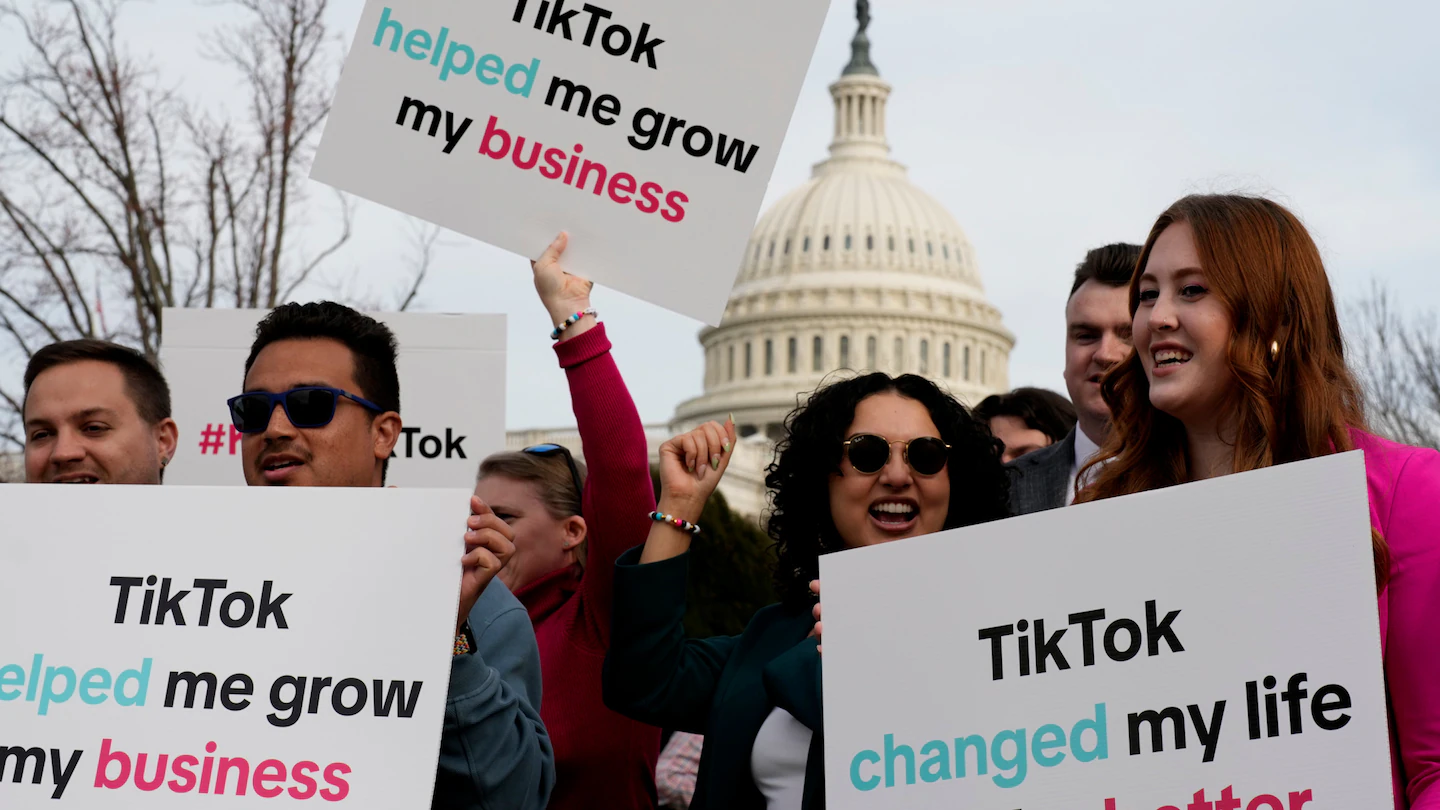Business
TikTok creators, business owners protest planned ban of app, say it threatens lives, livelihoods

TikTok creators, business owners protest planned ban of app, say it threatens lives, livelihoods
Small business owners, community advocates and educators have spoken against the US House’s overwhelming approval of a proposal to ban a popular app, TikTok.
The Washington Post reports that many content creators among others protested outside the Capitol on Wednesday March 13 after the House approved the proposal.
Contributing about $14.7 billion in revenue for small-business owners last year and $24.2 billion to US Gross Domestic Product, educators, activists, small business owners and young people who use TikTok argue that the app plays an increasingly crucial role in the national economy and American public life.
“Banning TikTok would shut down a lot of small businesses, including mine,” said Brandon Hurst, 30, a Los Angeles plant shop owner who credits the app with boosting lackluster sales. “These representatives and senators don’t understand that what they’re doing won’t just harm people they call ‘content creators.’ It would hurt small businesses.”
Dozens of TikTok supporters gathered outside the Capitol on Wednesday to oppose the measure, which passed the House with overwhelming support but faces an uncertain fate in the Senate.
Among them was Gigi Gonzalez, a financial educator from Chicago who said a TikTok ban would destroy her financially.
“It would get rid of my biggest source of revenue,” said Gonzalez, 34, who said she earns her living largely through brand deals on TikTok, speaking gigs she secures through TikTok and digital courses that she sells through TikTok. Before TikTok, Gonzalez said she mostly tried to reach people through webinars, which drew sparse attendance. Now, she said, she reaches millions, many of whom buy her courses and books.
“TikTok provides more benefit than harm than any other social media platform,” added Heather DiRocco, an artist and content creator from Montana who makes money by touting products in her videos and through the platform’s creativity program beta, which pays creators based on the number of views they amass on videos over a minute in length.
DiRocco is one of several plaintiffs seeking to overturn Montana’s first-in-the-nation ban on TikTok, which was set to take effect in January but was blocked by a federal judge.
“I could not replicate the money that I make on TikTok through any other platform,” DiRocco said. If a national ban passes Congress and President Biden follows through on his pledge to sign it, she said, “I will lose my biggest platform as a content creator, stripped from me with no recompense or compensation.”
Since rebranding in 2018 under the name TikTok, the app has risen to become one of the most popular social media platforms, with 170 million monthly users in the United States alone.
Hundreds of thousands of content creators make a living on the app, which has skyrocketed artists and influencers such as Lil Nas X, Doja Cat and Charli D’Amelio to overnight fame.
More than seven million American businesses market or sell their products through TikTok, according to the company.
According to a study issued Wednesday by Oxford Economics, a financial consultancy, TikTok drove $14.7 billion in revenue for small-business owners last year and contributed $24.2 billion to US Gross Domestic Product.
The study also found that TikTok supports at least 224,000 American jobs, with the greatest economic impact in California, Texas, Florida, New York and Illinois.
In addition to its economic impact, TikTok has become a huge educational hub.
Through its #LearnOnTikTok initiative, the company has partnered with more than 800 public figures, publishers, educational institutions and subject matter experts to bring educational material to the app.
TikTok also gives grants to educators and nonprofits that produce educational content.
“Both sides of the aisle know that TikTok is a crucial tool that many — particularly young people — use for education, advocacy and organizing,” said Annie Wu Henry, a digital strategist and content creator.
“It’s incredibly clear, too, that many of these politicians don’t fully understand what the app is that they are trying to ban or even why they are trying to ban it.”
Even as TikTok has become increasingly important economically, it has drawn fire from policymakers in both parties, who have expressed concern about the content being served to users of the app and about its parent company’s ties to China.
On Wednesday, Rep. Dan Crenshaw (R-Tex.) posted to X that “voting against this bill is a vote for the Chinese Communist Party.”
TikTok chief executive Shou Zi Chew responded to the House vote in a video, calling the result “disappointing” and encouraging the app’s users to speak out against the legislation.
“Over the last few years, we have invested to keep your data safe and our platform free from outside manipulation,” he said.
“We have committed that we will continue to do so. This legislation, if signed into law, will lead to a ban of TikTok in the United States. … It will also take billions of dollars out of the pockets of creators and small businesses.”
Proponents of the House measure claim the bill is not intended to ban the app, though experts say it would function as a ban.
The measure would require TikTok, which is owned by China-based ByteDance, to be sold to a US-based company within 180 days, which many say is unfeasible.
After that period web-hosting services would be prohibited from providing TikTok to the public.
Opponents of the measure are skeptical.
“It’s unrealistic that TikTok’s parent company would be able to sell the app within the US within six months, which is the time period the government mandates under this bill,” said Nora Benavidez, a civil rights and free-speech attorney and senior counsel at Free Press, a nonpartisan organization focused on protecting civil liberties.
“Faced with that likely scenario, the penalties they’d face in the case of such an event would result in TikTok being banned.”
Rep. Robert Garcia (D-Calif.), who voted against the measure, told a rally of opponents on Tuesday that “any ban on TikTok is not just banning the freedom of expression — you’re literally causing huge harm to our national economy.”
“Small-business owners across the country use TikTok to move our economy forward. Some of these creators and these business owners solely depend on TikTok for their revenue and their job,” Garcia said.
“To rush a process forward that could ban their form of work — particularly young people in this country — is misguided.”
Garcia added that the app is an important connection point for various social groups, including the LGBTQ+ community.
Tiffany Yu, 35, a disability activist in Los Angeles, said banning the app would be especially harmful to disabled people, many of whom have found it to be a lifeline during the isolation of the ongoing coronavirus pandemic, which is still keeping public spaces off limits to vulnerable people.
“TikTok has been able to help us find each other. Losing TikTok would remove us from that social fabric,” Yu said, adding that TikTok has become an economic lifeline for a group whose “unemployment rates are twice that of our non-disabled peers.”
The House bill would strip “millions of Americans of their rights of freedom of speech, and it’s really not okay,” said Carly Goddard, a content creator who also is a plaintiff in the case against the Montana TikTok ban.
“On TikTok, you see … what is going on in our world,” Goddard said. And “there is more to worry about in our world than banning an app.”
Business
Nigeria Fuel Prices May Rise as Middle East Crisis Deepens

Nigeria Fuel Prices May Rise as Middle East Crisis Deepens
Growing Middle East tensions triggered by ongoing military actions involving the United States and Israel against Iran may soon lead to higher fuel prices in Nigeria, following a surge in global crude oil prices to $72.87 per barrel.
The escalation followed a coordinated strike across multiple locations in Iran, including Tehran, significantly heightening geopolitical instability and fuelling fears of supply disruptions in global oil markets.
For Nigeria—where crude oil accounts for over 85 percent of export earnings and nearly half of government revenue—the implications are far-reaching. While higher oil prices could boost government income, analysts warn that Nigerians may soon face increased petrol (PMS) prices, especially in the current post-subsidy era.
Energy experts say the oil price surge presents a mixed outlook. Oil and gas analyst Ayodele Oni explained that while Nigeria could benefit from increased foreign exchange inflows, higher crude prices typically lead to higher landing costs for petrol, which are eventually passed on to consumers.
Similarly, energy expert Kelvin Emmanuel noted that Nigeria’s 2026 budget benchmark of $64.85 per barrel means the government stands to earn more revenue from rising oil prices. However, he warned that refineries will be forced to adjust fuel prices in line with market realities.
This includes domestic refiners such as the Dangote Refinery, which operates in a deregulated downstream environment where petrol prices are tied to crude oil costs, exchange rates, and operational expenses.
READ ALSO:
- ICPC Says It Found Wiretapping Devices in El-Rufai’s Abuja Residence
- Lagos Announces Traffic Diversions for Ogunnusi Road Reconstruction in Ikeja
- Global Crude Hits $73 as Middle East Tensions Escalate
Economic analyst Dr. Muda Yusuf, Chief Executive Officer of the Centre for the Promotion of Private Enterprise (CPPE), said geopolitical conflicts in the Middle East often trigger oil price spikes due to fears of supply disruptions—particularly around key shipping routes such as the Strait of Hormuz.
According to Yusuf, Nigeria could benefit from:
- Higher crude export earnings
- Improved foreign exchange inflows
- Stronger external reserves
- Increased FAAC allocations
However, he cautioned that Nigeria’s current oil production level of about 1.4–1.6 million barrels per day remains below capacity and is constrained by oil theft, pipeline vandalism, underinvestment, and infrastructure challenges. Without resolving these issues, the country may fail to fully capitalise on higher oil prices.
Yusuf also warned of inflationary pressures, noting that rising fuel costs could increase transport fares, food prices, manufacturing costs, and logistics expenses, worsening the cost-of-living crisis for Nigerian households.
Offering a more cautious outlook, energy economist Professor Wumi Iledare said the current oil rally may be temporary, explaining that modern oil markets operate on real-time data and rational expectations. He noted that unless the Middle East crisis leads to a sustained disruption in oil supply, prices may stabilise.
Energy law expert Professor Dayo Ayoade echoed this view, stating that many countries maintain strategic crude oil reserves, which could limit extreme price spikes. He added that even if prices approach $80 per barrel, Nigeria must remain cautious due to its debt obligations and oil-backed loans.
Ademola Henry Adigun, Chief Executive Officer of AHA Consultancies, said the crisis could further destabilise global energy markets, simultaneously boosting government revenue while raising petroleum product prices domestically.
Analysts stressed that to maximise potential benefits and minimise economic pain, Nigeria must:
- Strengthen anti-oil theft and pipeline protection measures
- Boost upstream oil production and investment
- Expand domestic refining capacity
- Save excess oil revenue during price surges
- Protect vulnerable households from inflation shocks
- Accelerate economic diversification beyond oil
Ultimately, experts describe the deepening Middle East crisis as a double-edged sword for Nigeria—offering short-term fiscal gains while posing serious risks of fuel price hikes, inflation, and economic hardship if not carefully managed.
Nigeria Fuel Prices May Rise as Middle East Crisis Deepens
Business
Global Crude Hits $73 as Middle East Tensions Escalate

Global Crude Hits $73 as Middle East Tensions Escalate
Global oil prices jumped to around $73 per barrel following fresh U.S. military strikes on Iran, heightening fears of supply disruptions in the Middle East and sparking volatility in global energy markets. The increase reflects growing geopolitical risks in a region that accounts for a significant portion of the world’s crude exports.
The surge affected major crude benchmarks. Nigeria’s Bonny Light crude rose to about $72.90 per barrel from $70.80, while Brent crude increased to $72.87 per barrel from $71.10. Murban crude, widely used as a benchmark for Middle East oil, climbed to $74.24 per barrel from $71.50, highlighting market sensitivity to regional tensions.
Geopolitical Concerns Drive Price Spike
Analysts attributed the surge to fears that ongoing conflict could affect production facilities, export terminals, and key maritime routes such as the Strait of Hormuz, a crucial corridor for global oil shipments. The potential for disruption in these areas has intensified market anxiety, pushing prices higher.
READ ALSO:
- Four Die in Katsina Stampede During Ramadan Alms Distribution
- ISWAP Fighter’s Female Relative Surrenders to Troops in Borno
- Gunmen Abduct Father of Former Ebonyi Deputy Governor on Way to Church
OPEC+ Announces Gradual Return of Production
Amid rising prices, OPEC+ members reaffirmed their commitment to stabilizing markets. In a virtual meeting on March 1, 2026, eight countries — Saudi Arabia, Russia, Iraq, United Arab Emirates, Kuwait, Kazakhstan, Algeria, and Oman — reviewed market conditions and announced a plan to gradually return 1.65 million barrels per day (bpd) of voluntary production cuts previously implemented in 2023.
Under the latest agreement, 206,000 bpd will be added back to the market in April 2026, with the remainder phased in gradually based on evolving market conditions. The alliance emphasized continued monitoring of market fundamentals, including global demand, oil inventories, and geopolitical developments, to ensure a balanced and stable market.
The countries also reiterated compliance with the Declaration of Cooperation, ensuring any excess production would be accounted for and corrected through future adjustments. Monthly meetings will continue to assess market trends, with the next session scheduled for April 5, 2026.
Market Outlook and Analyst Predictions
Analysts warned that the combination of geopolitical tensions and the gradual return of OPEC+ supply could result in volatile crude prices in the coming weeks. Traders are balancing potential risks to supply against incremental increases in production, creating uncertainty in both crude and refined fuel markets.
Some experts indicated that if the conflict escalates or disrupts key oil transit points, prices could surge further, potentially exceeding $75 per barrel in the short term. The recent uptick has already sparked expectations of higher gasoline prices at the pump in major consumer markets.
The energy market continues to closely monitor developments in the Middle East, OPEC+ output decisions, and global demand patterns as key indicators for near-term price movements.
Global Crude Hits $73 as Middle East Tensions Escalate
Auto
Ex-CIG Motors GM Jubril of Lagos floats Hybrid Motors Nigeria

Ex-CIG Motors GM Jubril of Lagos floats Hybrid Motors Nigeria

A former General Manager of CIG Motors, Jubril Arogundade, popularly known as “Jubril of Lagos,” has unveiled a new automotive venture, Hybrid Motors Nigeria, with a bold ambition to reshape access to hybrid, compressed natural gas (CNG), and electric vehicles across the country.
Arogundade announced the launch on his birthday, Saturday, February 28, describing the company as a response to Nigeria’s growing appetite for cleaner and more flexible mobility options. He said Hybrid Motors Nigeria aims to build “a unicorn brand in the automobile industry” within five years by bridging gaps in vehicle availability, service capacity, and supporting infrastructure.
According to him, the company’s strategy will rest on seven core pillars: local assembly of hybrid and electric vehicles; nationwide distribution of petrol, hybrid and EV models; establishment of aftersales service and training centres; spare parts supply and distribution; deployment of EV charging systems and stations with what he described as “energy intelligence”; auto asset financing; and vehicle leasing services.
He disclosed that the company’s physical rollout would be phased, with an official showroom scheduled to open in June, while plans are underway to commence factory operations next year. Although he alluded to strategic partnerships that would accelerate market entry and industry transformation, he did not name the partners.
The launch comes at a time when hybrid and alternative-fuel vehicles are attracting increasing interest in Nigeria, driven by rising fuel costs, demand for lower operating expenses, and a broader shift towards cleaner transportation. Fleet operators and private motorists alike are exploring options that offer fuel flexibility and more predictable maintenance.
Hybrid Motors Nigeria said its model goes beyond vehicle sales, combining product supply with service readiness through technical training, parts availability, and charging infrastructure to prevent post-purchase support gaps that often slow adoption.
Further details on the company’s initial vehicle lineup, partnership framework, and rollout timeline are expected ahead of the showroom inauguration.
Arogundade’s announcement follows his recent exit from CIG Motors.
While the company’s Chairman, Diana Chen, had announced the termination of his appointment after an investigation reportedly indicated alleged financial misappropriation and abuse of office, Arogundade has maintained that he voluntarily resigned on December 2, 2025, in line with his contractual and internal corporate obligations.
-

 International2 days ago
International2 days agoAyatollah Ali Khamenei, Iran’s Supreme Leader, Dies After U.S.–Israeli Strikes
-

 International2 days ago
International2 days agoIran: US, Israel launch another strikes, Commander, Defence leader, five other top officials killed
-

 International3 days ago
International3 days agoMiddle East on Edge as Iran Retaliates Against Israel, U.S Bases
-

 International2 days ago
International2 days agoKamala Harris Slams Trump for Dragging U.S. Into ‘Unwanted War’ in Iran Conflict
-

 metro2 days ago
metro2 days agoHajj, Umrah Are for Muslims Only – Scholar Urges NAHCON to Tighten Screening
-

 International1 day ago
International1 day agoIran Retaliates: Gulf States Allied With US Hit by Missiles, Drones
-

 International1 day ago
International1 day agoSaudi Arabia Denies Lobbying US to Strike Iran as Gulf States Respond to Escalation
-

 International2 days ago
International2 days agoBREAKING: Iran Forms Three-Member Leadership Council to Steer Country After Khamenei’s Death















